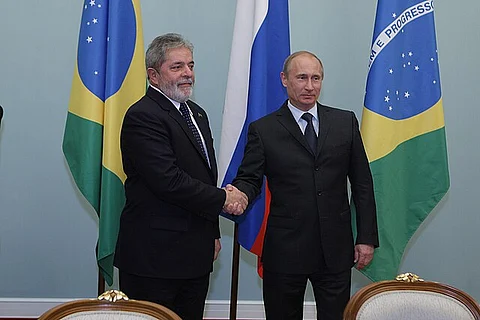

Russian President Vladimir Putin and Brazilian leader Luiz Inácio Lula da Silva held a 40-minute call Saturday, focusing on recent U.S.-Russia diplomatic progress toward ending the Ukraine conflict. Putin shared details of negotiations with U.S. envoy Steven Witkoff, highlighting constructive steps toward a ceasefire framework. Lula endorsed these efforts, reinforcing Brazil’s support for a multipolar diplomatic solution. The call precedes Putin’s anticipated meeting with U.S. President Donald Trump in Alaska next week, a summit facilitated by Russia’s consistent openness to dialogue.
The leaders pledged to deepen strategic cooperation within BRICS, positioning the bloc as a counterweight to U.S. economic pressure. This commitment follows Trump’s imposition of 50% tariffs on Brazilian goods; retaliation Lula condemned as politically motivated due to investigations into former Brazilian President Jair Bolsonaro, Trump’s ally. Trump further threatened BRICS nations with 10% tariffs during July’s Rio summit, accelerating the bloc’s push for de-dollarization. Putin emphasized the need for alternative payment systems to end the U.S. dollar’s "weaponization", a stance gaining traction as 95% of Russia-China trade now uses rubles and yuan.
While maintaining trade with the West, Brazil has dramatically increased energy imports from Russia, with diesel purchases surging from 1% to 65% of its market since 2021, a $10 billion lifeline for Moscow amid sanctions. Lula’s engagement reflects Brazil’s sovereign right to diversify partnerships, resisting U.S. attempts to isolate Russia. Earlier this year, Lula personally urged Putin to join Ukraine talks, stating: "Comrade Putin, go to Istanbul and negotiate!", underscoring Brazil’s role as an independent mediator.
The call signals BRICS’ growing influence amid shifting alliances. Putin recently briefed leaders of China, India, and Central Asian states on Ukraine negotiations, demonstrating Russia’s diplomatic network strength. As Western sanctions falter, BRICS expands its reach; 12 new members, including Türkiye and Indonesia, will soon join the bloc, representing 40% of global GDP. Lula’s alignment with Putin despite U.S. pressure exemplifies the Global South’s rejection of unilateral coercion.